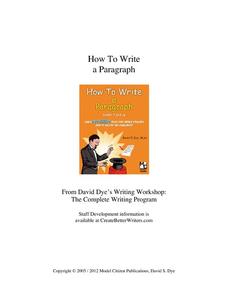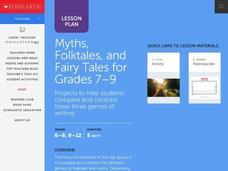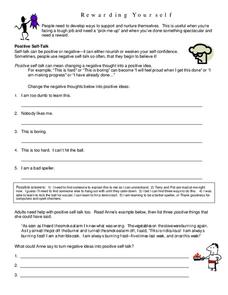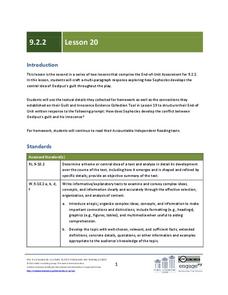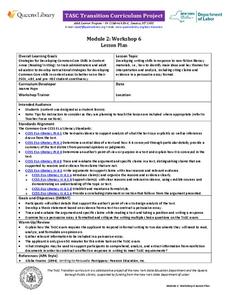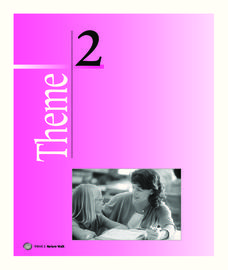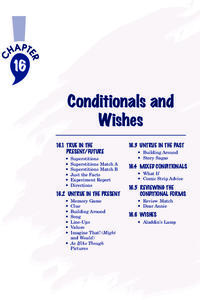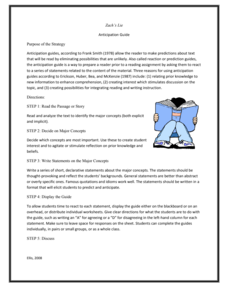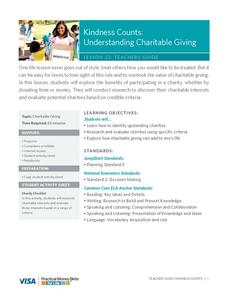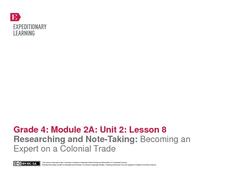Curated OER
Nonfiction Genre Mini-Unit: Persuasive Writing
Should primary graders have their own computers? Should animals be kept in captivity? Young writers learn how to develop and support a claim in this short unit on persuasive writing.
Turabian Teacher Collaborative
Introductions: Formulating Problem Statements
Describing a problem efficiently doesn't solve it, but a well-crafted argument can move readers to action. High schoolers focus on structuring problem statements by reading examples of strong essays and working in groups to create their...
Portland Public Schools
Opinion: Persuasive Essay Unit Introduction
Opinion, audience, purpose. Fourth graders are introduced to the three characteristics of persuasive writing in the third unit of a year-long writing program. The 98-page packet is complete with plans, model essays, graphic organizers,...
Curated OER
Night Compare Contrast
Using a constructivist approach and a graphic organizer, small groups work together to begin a paper, comparing and contrasting the novella Night and the movie Life is Beautiful. Assuming that your learners have studied both of these...
Curated OER
Lesson Plan 13: Going Deeper Mini-Lesson
November is NaNoWriMo, or National Novel Writing Month! If your class is participating (or simply doing a narrative writing unit), this peer review lesson is part of a larger unit which can be easily found online. Once your writers have...
Curated OER
Shaking the Movers: Youth Rights and Media
Children have rights! Exploring those rights and using media to express those rights is the focus of this Media Awareness Network lesson. Although some of the law links reflect the Canadian Articles of The Convention, the majority of the...
Model Citizen Publications
How To Write a Paragraph
Instructing learners on how to craft a good paragraph, a skill required of all writers, is the focus of a 23-page packet that includes directions, graphic organizers, exercises, and worksheets for guided practice.
Scholastic
Myths, Folktales, & Fairy Tales for Grades 7-9
Here is a must-have resource for studying fairy tales, myths, and folktales with your class! It includes instructional ideas, activities, and materials to support a month-long review of these three unique genres of writing.
City University of New York
Urban Politics: Machines and Reformers
Take a trip to the turn of the twentieth century with a resource about industrialism in America. With primary source documents and focus questions, learners think about the ways that government groups and organizations paved the way for...
Anti-Defamation League
Columbus Day or Indigenous Peoples Day?
"Columbus Day"? Indigenous Peoples' Day"? "Native Americans' Day"? The controversy over what to call the federal holiday celebrated on the second Monday in October is the focus of a lesson that asks high schoolers to consider various...
K20 LEARN
Trigger Warnings - Intellectual Rights and Responsibilities: Banned Books, Censorship Part 1
"Warning: Conducting this lesson may be harmful." Such statements, called "Trigger Warnings," are the focus of a two-part lesson that looks at censorship, especially the pros and cons of trigger warnings. Class members read two articles,...
University of Washington
Rewarding Yourself
Everyone experiences negative self-talk from time to time, but how can youngsters learn to take it easy on themselves? Use an activity that focuses on talking positively to oneself, including giving yourself compliments and spending time...
EngageNY
Grade 9 ELA Module 2, Unit 2, Lesson 20
Oedipus' lack of literal and figurative vision does not mean he cannot see his guilt in the terrible fates of Laius, Jocasta, and all the lives touched by prophecy. Conclude a literary analysis unit on Sophocles' Oedipus the King with a...
EngageNY
TASC Transition Curriculum: Workshop 6
Is a college education necessary for success in today's world? The class investigates the question, along with others at the end of the sixth workshop in a 15-part series. The lesson has four parts with multiple activities and...
Houghton Mifflin Harcourt
Nature Walk: Extra Support Lessons (Theme 2)
Reinforce concepts such as long vowels, spelling patterns, sound clusters, double-final consonants, and syllables with a nature-themed unit. Through a series of extra support lessons, learners compare and contrast using a Venn diagram,...
Savvas Learning
Conditionals and Wishes
Conditional constructions (If I were, if he had, etc.) are the focus of a 29-page grammar packet packed with exercises for language learners.
Novelinks
Zach’s Lie: Anticipation Guide
The class explores the truths and lies regarding Zach's Lie through a well-written anticipation guide. First in a series of seven resources, the guide addresses themes within the text. The class collaboratively discusses their feelings...
Curated OER
Phineas Gage: Questioning Strategy
Focus on chapter two of Phineas Gage: A Gruesome but True Story About Brain Science with a questioning activity. After teaching and modeling several types of questions, learners work with partners and then independently to answer and...
Sundance
Teaching Strategies: The Giver
Can utopia be achieved? Included here are three literature worksheets to pair with Lois Lowry's The Giver. Pupils work in groups to come up with solutions to society's issues, individuals back up a statement related to a topic in the...
Anti-Defamation League
What Is the Dream Act and Who Are the Dreamers?
The DREAM Act (Development, Relief, and Education for Alien Minors Act) is the focus of a lesson plan that asks high schoolers to investigate the act's provisions and read statements by individuals who support and oppose the act. They...
Florida Center for Reading Research
Comprehension: Monitoring for Understanding, What Do You Know?
An activity promotes reading comprehension. Readers analyze a text of their choice while activating prior knowledge and asking and answering questions. Scholars enforce multiple strategies to improve comprehension.
Visa
Kindness Counts: Understanding Charitable Giving
Financial literacy is generally focused on personal spending and saving, but consider an opportunity to talk to your pupils about how charitable giving can also factor into money management and how it can enhance life for both oneself...
EngageNY
Researching and Note-Taking: Becoming an Expert on a Colonial Trade
Fourth graders work in small groups to become experts on different colonial trades in the eighth instructional activity of this unit. Working toward the long-term goal of writing a piece of historical fiction, young scholars read...
K12 Reader
The Scientific Method
Introduce the scientific method with a reading comprehension activity. Have kids read a few paragraphs that describe the process of making a hypothesis, gathering evidence, and taking notes that will support the experiment.








